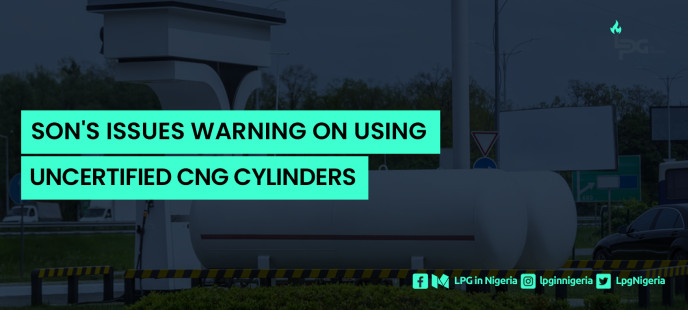- 3896
- 0
Sharing Ideas and Updates on LPG in Nigeria and related information to enable effective collaboration within the LPG Value Chain
SON's Issues Warning On Using Uncertified CNG Cylinders

The Standards Organisation of Nigeria (SON) has issued a critical public safety warning concerning the use of uncertified compressed natural gas (CNG) cylinders, following a recent explosion at the NIPCO CNG refueling station in Benin City, Edo State. This incident underscores the risks associated with substandard and uncertified gas equipment, prompting SON to emphasize the importance of adhering to approved standards for CNG use across Nigeria.
As the custodian of quality standards in Nigeria, SON reiterated its commitment to ensuring public safety through robust regulatory measures. These measures aim to guarantee that all CNG equipment, including cylinders and conversion kits, meet rigorous safety requirements before being certified for public use.
In collaboration with the Presidential Initiatives on CNG and other government bodies, SON is finalizing the Nigerian Gas Vehicle Monitoring System (NGVMS). This centralized platform will enhance the monitoring and surveillance of CNG systems, ensuring that only vehicles equipped with certified conversion kits access gas at retail outlets. Additionally, NGVMS will provide a database of approved CNG equipment and suppliers, a significant step in mitigating risks associated with substandard installations.
Key Safety Insights: Differences Between LPG and CNG Cylinders
One of the critical aspects of SON’s advisory is educating the public about the structural and functional differences between LPG and CNG cylinders.
Pressure Capacity:
LPG Cylinders: Designed to handle a working pressure of up to 7 bar and tested for up to 30 bar.
CNG Cylinders: Built to withstand much higher pressures, with a working capacity of 200 bar and tested for up to 300 bar.
Construction:
LPG Cylinders: May have welded seams that are unsuitable for high-pressure containment.
CNG Cylinders: Seamless construction ensures durability under the intense pressures associated with CNG vehicles.
Advisory for CNG Vehicle Owners
CNG vehicle users are strongly advised to install only SON-certified cylinders and ensure their vehicles are equipped with approved conversion kits. Using uncertified equipment poses significant safety risks that cannot be overlooked.
SON also urges CNG refueling stations to conduct on-the-spot inspections to verify compliance with safety standards. Approved conversion kits must display required labels identifying the certifying conversion center.
Strengthening Nigeria’s CNG Framework
The drive toward cleaner energy, as championed by initiatives like the Presidential Initiative on CNG, requires robust regulatory support to ensure safety and sustainability. SON is steadfast in its commitment to developing and enforcing standards for CNG products, thereby strengthening the regulatory framework and safeguarding lives and property.
By prioritizing certified equipment and proper installations, Nigeria can foster the safe use of CNG as a cleaner, cost-effective alternative to traditional fuels.
















0 Comment.